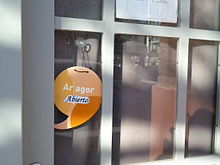This article needs additional citations for verification. (October 2014) |
| Patagonian Welsh | |
|---|---|
| Cymraeg y Wladfa | |
| Native to | Argentina |
| Region | Chubut |
| Ethnicity | Welsh Argentines |
Native speakers | Unknown |
Indo-European
| |
| Latin (Welsh alphabet) | |
| Language codes | |
| ISO 639-3 | – |
| Glottolog | pata1258 |
| IETF | cy-u-sd-aru |



Patagonian Welsh (Welsh: Cymraeg y Wladfa) is a variety of the Welsh language spoken in Y Wladfa, the Welsh settlement in Patagonia, Chubut Province, Argentina. Patagonian Welsh has developed to be a distinct dialect of Welsh, different from the several dialects used in Wales itself; however, the dialects have a high degree of mutual intelligibility, and speakers from Wales and Patagonia are able to communicate readily. Numerous toponyms throughout the Chubut Valley are of Welsh origin.
Teachers are sent to teach the language and to train local tutors in the Welsh language, and there is some prestige in knowing the language, even among those not of Welsh descent. Welsh education and projects are mainly funded by the Welsh Government, British Council, Cardiff University and the Welsh–Argentine Association. In 2005 there were 62 Welsh classes in the area and Welsh was taught as a subject in two primary schools and two colleges in the region of Gaiman. There is also a bilingual Welsh–Spanish language school called Ysgol yr Hendre situated in Trelew, and a college located in Esquel. In 2016 there were three bilingual Welsh–Spanish primary schools in Patagonia.
The decimal numeral system used in Modern Welsh originated in Patagonia in the 1870s, and was subsequently adopted in Wales in the 1940s as a simpler counterpart to the traditional vigesimal system, which still survives in Wales.
A total of 1,220 people undertook Welsh courses in Patagonia in 2015.
The formal Eisteddfod poetry competitions have been revived, although they are now bilingual in Welsh and Spanish.